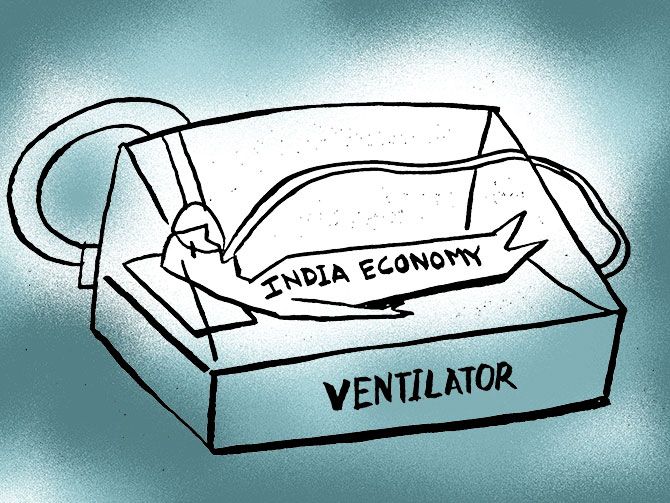Moody's Investors Service on Friday said India's economy is expected to contract for the first time in more than four decades saying economic damage owing to the coronavirus-induced lockdown will be significant with lower consumption and sluggish business activity.
Illustration: Dominic Xavier/Rediff.com.

Even before the coronavirus outbreak, Indian economy already was growing at its slowest pace in six years and with the stimulus measures announced by the government falling short of expectations, the disruptions are likely to be greater.
"We now expect India's growth to register a real GDP contraction for the fiscal year ending in March 2021 (fiscal 2020-21), from our earlier projection of zero growth," it said in a research note.
It however expected the economy to see a recovery in fiscal 2021-22, somewhat stronger than its earlier forecast of 6.6 per cent growth.
"Economic damage as a result of India's continued coronavirus lockdown, now extended through May 31, will likely be significant and reflect the country's inherent economic vulnerabilities and fiscal constraints, with wide-ranging effects on both the public and private sectors," it said.
Prime Minister Narendra Modi imposed a nationwide lockdown to control the spread of coronavirus on March 25. It has been extended thrice, with the fourth phase set to expire on May 31.
The lockdown has presented a challenge to the country's unorganised sector, which accounts for more than half of GDP.
The first phase of the lockdown largely affected low-income households and daily wage earners.
Restrictions have been eased gradually in the subsequent phases as the government attempts to restore normalcy to economic activities. In the current fourth phase, states have autonomy to decide on the delineation of areas into red, orange and green zones depending on outbreak intensity.
With India now in the fourth phase of its coronaviorius lockdown, the disruption to incomes will likely keep household consumption under pressure for the rest of the year, it said.
While the government's cumulative policy response brings total headline stimulus announcements to a sizeable Rs 20.9 lakh crore, or 10 per cent of GDP, and includes a range of support measures that will bring a degree of relief to rural households and small businesses, the measures are unlikely to offset lower consumption and sluggish business activity resulting from the extended lockdown.
"Direct fiscal stimulus spending by the government is likely to be in the range of 1-2 per cent of GDP, as most of the government's plans take the form of credit guarantees or are aimed at easing liquidity concerns for affected sectors," Moody's said. "The quantum of direct fiscal spending falls short of our expectations and is unlikely to provide much additional impetus to growth."
Moody's said the economic shock from the lockdowns and fiscal policy response is expected to result in significant slippage from the central government's budgeted deficit target of 3.5 per cent of GDP for fiscal 2020-21.
While the direct fiscal spending by the government in the stimulus is limited to 1-2 per cent of GDP, weaker overall revenue and disinvestment receipts (from government asset sales), will likely drive up the deficit in fiscal 2020-21, it said.
Before the start of the lockdown in March, activity indicators such as passenger car sales (a proxy for urban demand) and motorcycle sales (a proxy for rural demand) already pointed to weak household demand.
Also, inflation had outstripped nominal wage growth, reducing the purchasing power of rural households.
Preliminary estimates from the Centre for Monitoring Indian Economy indicate that the national unemployment rate surged to more than 20 per cent within a week of the lockdown, a nearly threefold increase compared with the rate before the pandemic.
"Even as restrictions gradually ease, disruption to incomes will likely weigh on household consumption for the rest of the year. Lower consumption and sluggish business activity will result in a sharp decline in India's economic growth in fiscal 2020-21," it said.
The rating agency expected the economic shock from the coronavirus and the fiscal policy response to result in significant slippage from the central government's budgeted deficit target for fiscal 2020-21.
Stating that asset quality of financial institutions will deteriorate and finance companies' liquidity will be under pressure, it said asset quality will deteriorate significantly, although it will not be visible in near-term reported numbers because of regulatory forbearance.
Automobile, oil and gas, and mining companies will bear the brunt of the downturn. Corporate sectors that are sensitive to consumer demand, sentiment and supply chain disruptions will be particularly hard hit. Companies that provide essential goods and services have low exposure, it said.
Weaker demand, it said, will weigh on power and transport sectors. "Power demand will likely weaken substantially in fiscal 2020-21. The transportation sector will be under severe stress because of the decline in consumer demand and travel restrictions," it noted.
The economic slowdown will hit the performance of commercial vehicle and micro, small and medium-sized enterprise (MSME) loans. "The effects will be more significantly negative if the outbreak spreads and suspension of business activity is prolonged," it said.











 © 2025
© 2025